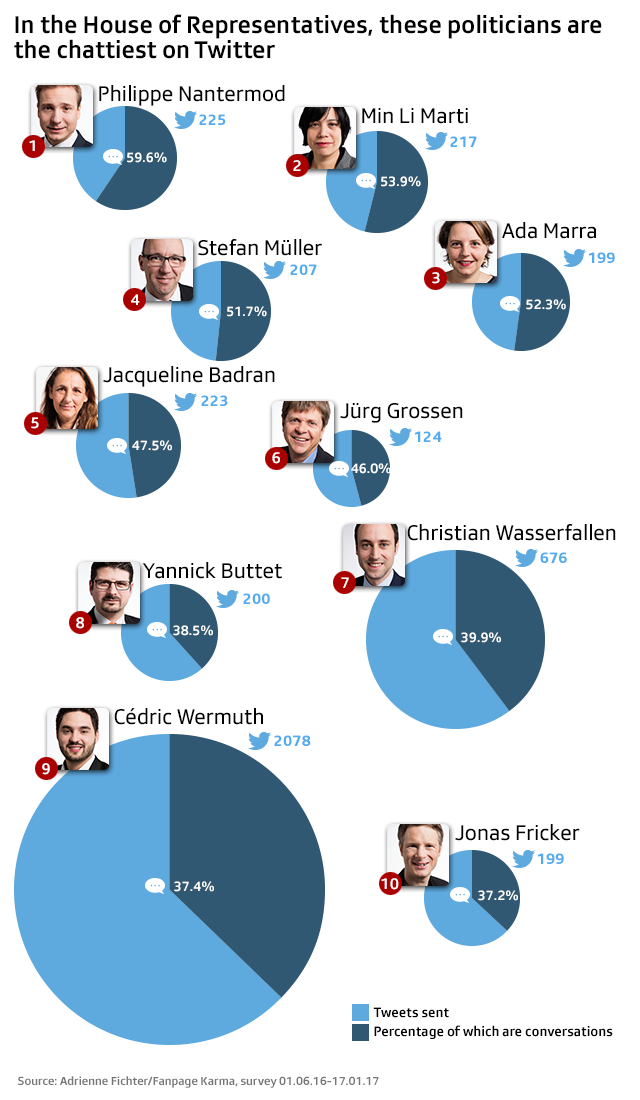The Swiss politicians who have mastered Twitter

Everyone seems to be talking about Twitter right now, partly thanks to United States President Donald Trump and his constant stream of tweets. Swiss politicians are also communicating using 140 characters, but very often in one direction. Who are the politicians actually interacting with their Twitter followers? swissinfo.ch investigates.
For Swiss politicians Twitter profiles are no longer a novelty. Many parliamentarians in the House of Representatives tweet important announcements or post pictures of themselves campaigning on the social media platform.
Tweets fly in all directions during the four annual sessions of parliament, using the popular hashtag #parlCH to link to ongoing political business. Parliamentarians are particularly vocal if votes in the lower chamber do not go in their favour. They use their phones to capture unexpected behind-the-scenes action or to catch their opponents off guard.
This tweet by leftwing Social Democrat parliamentarian Jacqueline Badran shows a protest by the conservative right members of the Swiss People’s Party in the House of Representatives in December.
Die andere Art der Artikulation #SVPExternal link #parlCHExternal link bei der @JusoSchweizExternal link abgeguckt? pic.twitter.com/db3i2gN1HuExternal link
— Jacqueline Badran (@JayBadran) 16. Dezember 2016External link
Twitter is no doubt very popular among parliamentarians because it gives them easy access to the media.
“Twitter is a powerful multiplier network, in which many journalists can be found,” said communications expert Marie-Christine Schindler.
Burnout
Swiss parliamentarians are also well aware of the social media platform’s addictive side. Natalie Rickli of the People’s Party suffered a burnout in 2012, partly due to social media.
“Work, politics, Facebook and Twitter – I had to constantly have my wits about me. Switching off and relaxing was something exceptional,” she wrote on Facebook before taking a digital detox. Today, Rickli is back and one of the most influential parliamentarians in Bern.
Influence in this context does not necessarily mean power or assertiveness during political debates. The recently established – and controversial – Einflussreich.ch ranking by specialists from the Kublé agency measures political influence in a so-called political clout index (see infobox). But these kind of indexes, and other indicators discussed in the media, such as number of followers on Twitter or Facebook, do not really reveal how far the individual really understands social media.
The fact remains that Twitter and Facebook are media channels for dialogue and not one-way communication.
“In my opinion, many political actors have a false understanding of social media, thinking it is primarily a way of announcing things and issuing statements, like traditional mass media,” explained Christian Schenkel, head of the online communication course at the Swiss School of Journalism in Lucerne.
But Twitter followers do not just want to receive information. They also want to have a conversation, added Schenkel.
One-way tweets
The give-and-take – tweeting, retweeting and replying – required for social media communication has still not been properly understood by Swiss politicians even ten years after the birth of Twitter. Many take to the internet solely in sender mode.
To find out how keen parliamentarians are to enter into conversation on social media, swissinfo.ch studied the Twitter profiles of the 50 Swiss parliamentarians with the highest clout rankings. Are parliamentarians who appear to be good tweeters prepared to enter into conversations? The person who holds the top spot in the ranking seems to confirm this hypothesis.
The most influential parliamentarian is also the one who enjoys debates: 32-year-old Philippe Nantermod, from canton Valais, is a member of the centre-right Radical Party. He scored 59% for ‘DialogueTweets’, which indicate his interest in replying to questions and comments on Twitter.

Nantermod is happy with this top spot. It’s clear that a presence on social media goes together with a willingness to answer questions, he told swissinfo.ch. He said it was crucial to talk freely to other people – one of the “main principles of politics”.
“When you are in the streets, if someone greets you or asks you a question, you don’t remain silent. So, why should it be any different online?” he declared.
Here is Nantermod tweeting away to his followers:

Those who follow in the clout ranking cannot be compared with the most influential politicians who tweet. Politicians who have considerable reach according to the Klout score are therefore not necessarily good listeners.
Nantermod is followed by Social Democrat Min Li Marti from Zurich. She occupies seventh place in the einflussreich.ch ranking and scored 54% for “DialogueTweets”. She said it was normal practice to reply to her followers.
“I am very conscious of this. Social media without dialogue is pointless. But what I ignore are insults and trolls,” she added.
Not everyone agrees. Social Democrat Matthias Aebischer and Martin Candinas from the centre-right Christian Democratic Party were not that keen on chatting to Twitter followers. They came last in swissinfo.ch’s evaluation. Their tweets got an echo among their followers but subsequent reactions don’t seem to interest the politicians.
For Aebischer, issues such as timing and strategy are important. “I am very conscious of this. That’s how I’ve been doing things from the very beginning. I send replies by email. The exceptions are false statements on Twitter and Facebook. If someone claims I am pro-EU, then I react, but most of the time others have already done it for me.”
Candinas said his decision to refrain from interacting with people on Twitter was also a deliberate one: “If you start, everyone expects it, and more and more people start debating. I have no time for that.”
Time is one of the main reasons why many parliamentarians are still struggling with online debate. But avoiding answering people on social media can have a negative long-term impact on reputation, according to Schenkel.
He admitted that it takes a huge amount of time to maintain social media networks. “Those who are active on social media can build long-term relationships, but this requires a clear communication strategy and, above all, time, time, and more time. Anyone who isn’t aware of this should forget about engaging on social media.”
Schindler also believes it is valid if a politician doesn’t want to be present on social media if this is their deliberate communication strategy. The limit of 140 characters could, for example, be an obstacle to expressing political positions.
“Twitter and politics are compatible in a limited way,” Schindler said. “Many topics are just too complex to handle, and trolls make life difficult for politicians.”
Aebischer said the 140-character limit was not a restriction to dialogue – quite the contrary: “140 characters suit me very well. I like think things that are short and to the point.”
The fact is that despite the emergence of Twitter and Facebook, Swiss politicians still rely heavily on e-mail. This was confirmed when researching this article. When I sent my initial email request, each parliamentarian answered within 15 minutes.
Methodology
swissinfo.ch studied the Twitter exchanges of 50 Swiss parliamentarians over a six-month period (June 1, 2016 to January 17, 2017). The parliamentarians were selected according to those with the highest “Klout score”, which measures their influence on Twitter.
In addition to their reach and the relevance of the respective followers on Twitter, we measured how interactions were triggered by specific tweets.
The site www.fanpageKarma.net was used to analyse profiles and to compare criteria on how open individuals were to dialogue. The site measures the percentage of @-reply tweets, which show an interaction with another Twitter profile.
The higher the conversation rating, the more involved a user is discussion with others. Philippe Nantermod recorded the highest value (59%) for all Swiss politicians. Almost two-thirds of his tweets were conversations with other users. We did not make a similar comparison with the Facebook pages of Swiss politicians, as analysis tools are not available to study similar behaviour patterns.
Translated from German by Simon Bradley

In compliance with the JTI standards
More: SWI swissinfo.ch certified by the Journalism Trust Initiative
You can find an overview of ongoing debates with our journalists here . Please join us!
If you want to start a conversation about a topic raised in this article or want to report factual errors, email us at english@swissinfo.ch.